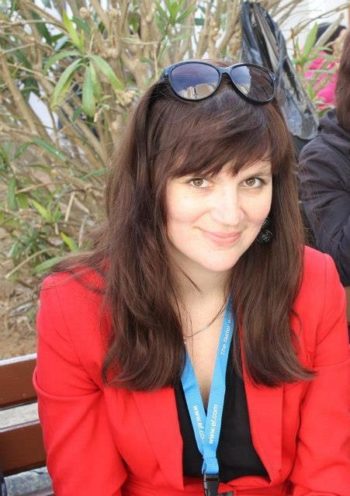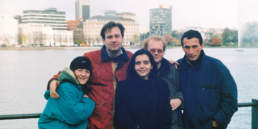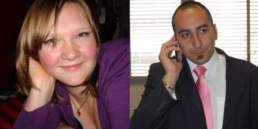Equal opportunities for young people in Armenia, Azerbaijan, Belarus, Georgia, Moldova and Ukraine – that’s what AEGEE-Europe’s Eastern Partnership Project (EaP) is about. This year countless activities will take place, from Action Days to conflict resolution events, a great educational mobility conference, Summer Universities and more. The Nagorno-Karabakh conflict will enjoy a special focus. “We think that AEGEE-Europe should make a case for the inclusion of students from the East – especially since they are already part of our network”, says project manager Alla Resheten. She told the Golden Times more about this ambitious project.
Golden Times: Alla, what is the Eastern Partnership Project (EaP) about?
Alla Resheten: The Eastern Partnership project is about ensuring equal opportunities for young people from the target countries and EU member states. We are focusing on the youth part of the platform 4 “Contact between people” of the Eastern Partnership initiative of the European Commission – and in addition to it on peace building in the target region. Apart from this we want to improve knowledge of young people about cultural, historical and political background of the target countries. It is important for us as for the student network to know and understand each other better. This helps to avoid different kinds of confusions and to make a stronger cooperation between locals inside of our network and with other youth NGOs in the region. In short: the project is built on three main pillars: youth mobility in education, conflict resolution and active citizenship.
 Golden Times: Which are the EaP countries?
Golden Times: Which are the EaP countries?
Alla: Eastern Partnership countries are Armenia, Azerbaijan, Belarus, Georgia, Moldova and Ukraine. We took an EU initiative as a basis that’s why we have these countries.
Golden Times: Why do young people in these countries need support?
Alla: Young people in EaP countries are facing a lot of limitations. Taking into account the limited opportunities of young people in EaP countries, and considering that the efforts of the European Union do not sufficiently target these limitations of young people, we think that AEGEE-Europe as the European Students’ Forum should make a case for the inclusion of students from the East – especially since they are already part of our network.
Golden Times: What are the main activities? Conferences, surveys or something else?
Alla: Our project is working on the three different directions, which is why we have different kind of activities. For the “youth mobility in education” pillar we are mainly focusing this year on improving knowledge of young people from the EaP countries about current educational mobility programmes opened to the EaP countries and application procedures. This is implemented by Action Days. Currently we have already three locals, which are willing to host Action Days, but we are still waiting for more applications. Our team manual helps to prepare these Action Days; it includes all information about programmes, application procedures plus stories from young people who have taken part in such mobility programmes in the past. Another thing on which this pillar is working: promotion and recognition of the non-formal education in cooperation with the Higher Education Days project of AEGEE-Europe. In this field we will have a number of seminars. The biggest event which is planned for this pillar is a conference on mobility programmes which will take place in Kyiv in October.
Golden Times: What will happen in the second pillar?
Alla: The second pillar is the most challenging one – conflict resolution. We’ve decided to focus on the Nagorno-Karabakh conflict within this year. We are planning a number of Action Days about conflicts in the region and their historical and political background; we also plan a regional training course on the peace building issue in Caucasus and a conflict resolution training which will take place in Oviedo in September.
Golden Times: Very ambitious! What about the last pillar?
Alla: As for the last pillar – Active Citizenship – we are mostly implementing our aims through different kinds of Action Days: Eastern Partnership Action Days, Volunteering Action Days, and Visa Action Days.
Golden Times: Great! When did the project start?
Alla: The idea of the project was born in August 2010, when the Comité Directeur 2010-2011 was drafting its Action Plan. In January 2011 we published the Eastern Partnership Agenda with results of the research on the topic. In February we selected four people from the network. Together with them I was working on developing a Flagship topic proposal which was unfortunately not elected by Agora Alicante. In May 2011 we grew up to 16 people in a team and currently we have 21 people from 15 different countries!
Golden Times: When will it finish?
Alla: The current project plan is written for two years. So we are planning to finish our activities in the end of 2013 and to close the project in 2014.
Golden Times: Which major events took part so far and where and when?
Alla: So far not that many activities have taken place as we were focusing on clarifying our final objectives and developing our activities. In 2011 we had the first wave of Eastern Partnership Action Days, which were organised by AEGEE-Budapest and AEGEE-Passau. We also had a team meeting which was hosted by AEGEE-Yerevan. Apart from this we were actively participating in all Eastern Partnership related external activities and conferences organised by the Polish Presidency in 2011.
Golden Times: Are there any results so far?
Alla: It’s too early to talk about results as the project is quite big and the objectives are very ambitious. I think that at the Spring Agora in Enschede we will be able to give updated information about our progress. For now I can suggest you to check a video which was prepared by AEGEE-Passau as a result of their EaP action day.
Golden Times: What are the next EaP events that AEGEE members can take part in?
Alla: Currently we have issued open calls for hosting locals for our EaP Action Days, Youth Mobility Action Days and in the nearest future will send an open call for the volunteering Action Day. This spring our Action Days will be hosted by AEGEE-Groningen, AEGEE-Baki, AEGEE-Yerevan, AEGEE-Kyiv, AEGEE-Dnipropetrovsk, AEGEE-Poznan, AEGEE-Praha and hopefully we will find even more interested locals. Apart from this we are working on a Conflict Resolution event in Oviedo, which will take place in September 2012, the Educational Mobility conference in Kyiv in October 2012, a Networking Event in Catania, two Summer Universities – one organised by AEGEE-Yerevan and another one by AEGEE-Katowice&AEGEE-Dnipropetrovsk, a Model of European Union event, which will be organised in cooperation with the IPWG most probably in Autumn 2012 and many other activities. I can just suggest to follow our Facebook page and website in order to be updated about all activities we are working on.
Golden Times: Except for attending events, how can AEGEE members contribute to the projects’ success?
Alla (smiling): By organising events! It is great to see the huge support to our project from the whole network, so I would like to encourage everyone to contact us, who has an idea of how the project can be more efficient on implementing its objectives, or if you have some contacts which can be useful for the project.
Golden Times: Except for you, who are the people in the project team?
Alla: As I’ve already mentioned currently we have 21 persons in the team. As you can imagine it’s not that easy to work with such big group of people especially when all of us are living far from each other. Our project is divided for four sub-teams: a main team and three pillar teams. More about our team you can read at the team page of our web site.
Golden Times: How will you disseminate the results?
Alla: We are establishing a lot of partnerships with externals such as National Youth Councils, National EaP platforms, different organisations working on the European integrations issues, the EastBook web portal and others. We will work together with all our partners on different stages of the project and will spread our results through them using press releases, stakeholders meetings, articles on media partners sources and other ways.
Golden Times: Where can AEGEE members find out more about the EaP project?
Alla: We are currently developing our webpage: www.aegee.org/eap where we will place a lot of information about our project and also a lot of external information about EaP. Unfortunately today the webpage is not ready to be officially launched. I hope by the end of February we will manage to fill it with all information we want to share with our members. Meanwhile I want to encourage everyone who is interested in our project development to follow us on Facebook: www.facebook.com/AEGEE.EaP.
Golden Times: Anything else you’d like to add?
Alla: I would like to thank to Golden Times for showing interest to our project! And once again I would like to encourage everyone to participate in our project activities. We hope to see all of you during the Agora Enschede at our workshops and the AEGEE Fair table – we are preparing a lot of interesting things so do not miss it!
More info:
Project page on Facebook: www.facebook.com/AEGEE.EaP
AEGEE-Passau Action Day video: www.youtube.com/watch?v=FiAe8BC4ISw&feature=youtu.be


